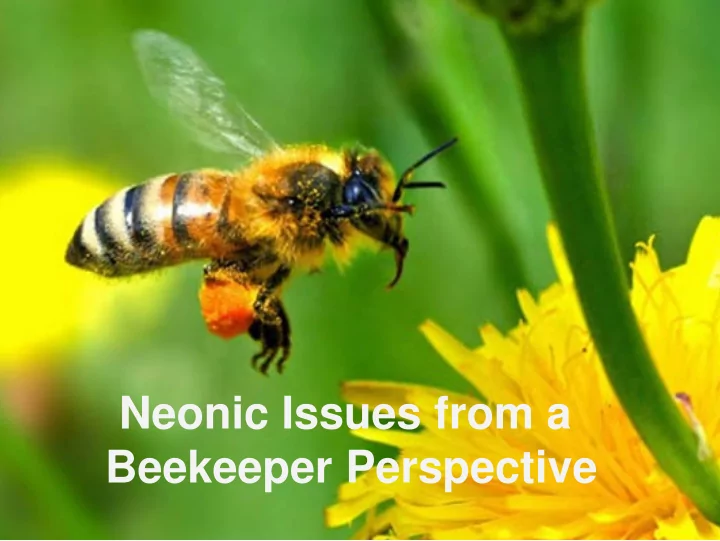

Neonic Issues from a Beekeeper Perspective
Gene Brandi Apiaries, Los Banos, CA • Began working with bees - early 1970’s while at Cal Poly SLO • After graduation began working bees full time • Started my own business in 1978 • Today - manage 2,000 colonies of honey bees throughout Central California with my son (also a Poly grad)
Much more difficult to keep bees alive and healthy today than it was in the 1970’s. • 5% winter loss in 1970’s • 13% to 45% winter loss in my operation during the past 10 years • Queen bees used to live from one to two years, now we are fortunate to have them for one year. (Queen cost=$21-$22)
Major issues which negatively impact col • Pesticides • Mites • Nutritional issues • Diseases
• Bees can be negatively impacted by a variety of pesticides • Neonics present serious issues for bees due to their high toxicity and long residual activity • Neonic treated seed (planting issues, etc.) • My experience with neonics includes foliar applications on crops such as cotton, melons, and tomatoes, as well as systemic applications through drip irrigation systems • Bees can pick up pesticide contaminated nectar, pollen, or water as well as direct drift
• Bees can be impacted by acute toxicity from pesticides with results such as in my previous photos • There can also be sub lethal pesticide effects on individual bees which can be lethal to the colony • These other effects can include damage to queens, drones, brood (developing bees within the colony), or changes in adult bee behavior which is detrimental to the individual bees as well as the colony
• Our bees are able to survive in the agricultural areas of Central California through the use of short residual pesticides applied at night • Most Neonics have too long of a residual to be safely applied to blooming plants • Recent kill from dinotefuran on tomatoes • clothianidin, imidacloprid, thiamethoxam on cotton • Almonds removed from imidacloprid label
What do Scientists Say about Neonics? The Task Force on Systemic Pesticides is an independent group of scientists from all over the globe, who came together to work on the Worldwide Integrated Assessment of the Impact of Systemic Pesticides on Biodiversity and Ecosystems. They reviewed more than 1,100 peer reviewed studies from all over the world and published their findings earlier this year.
The Task Force on Systemic Pesticides scientific assessme
It is extremely important that scientists be allowed to conduct their research freely and not be hindered in any man Some scientists have experienced retribution if the results of their research are viewed as being controversial. Sound science cannot continue to exist with external pressure which keeps scientists from effectively doing their work. Let’s all work together to make sure scientists are able to freely conduct and publish their research!
Thank You!
Recommend
More recommend